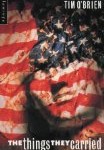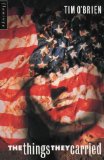Five words from the blurb: Vietnam, war, healing, masterpiece, devastating
The Things They Carried is a modern classic. It has been described as “one of the war books of this century” and “essential fiction about Vietnam”. Before starting the book I knew little more than that, but on finishing it I can only agree. This is a very important book and I’m sure it will be read for generations to come.
The Things They Carried is a series of short stories about the Vietnam War. If I’d known that I wouldn’t have read it – I tend to get frustrated by short stories, longing for more character development and the complex plot of a longer novel. I experienced these problems with this book and that is why I haven’t rated it as highly as others, but I’m pleased I read it and if you enjoy short stories then you will really appreciate it.
The writing in this book is stunning. I especially loved the repetitive writing style of the first chapter:
They carried chess sets, basket balls, Vietnamese-English dictionaries, insignia of rank, Bronze Stars and Purple Hearts, plastic cards imprinted with the Code of Conduct. They carried diseases, among them malaria and dysentery. They carried lice and ring worm and leeches and paddy algae and various rots and molds. They carried the land itself – Vietnam, the place, the soil – a powdery orange-red dust that covered their boots and fatigues and faces. They carried the sky. The whole atmosphere, they carried it, the humidity, the monsoons, the stink of fungus and decay, all of it, they carried gravity.
The rest of the book highlighted individual events from the war, portraying shocking scenes with sensitivity and emotional power. Each situation was vividly described, but I longed for the events to be connected by a compelling narrative. Yes, some of the characters reappeared in subsequent chapters, but the narrative jumped forwards and backwards in time, giving it a disjointed feel that distanced me from the horrors. I wanted an emotional connection to the characters and to see their personalty change and develop with the increasing hardship of war.
The book provides a lot of thought provoking passages about the mental burden or war – how it really feels to kill someone and how it is possible (or not) for a soldier to return to their previous life after experiencing these horrors. There is also an impressive piece of writing about being conscripted for war.
There is a lot to admire in this book and I do think it is an extremely important piece of literature. I wish I could love it as much as I feel I should do.

.
The thoughts of other bloggers:
One of the most moving, beautifully written books I’ve ever read. Bookfoolery and Babble
Tim O’Brien’s writing in this is absolutely breathtaking. He has the ability to put you right there in the middle of Vietnam with all the characters. The Betty and Boo Chronicles
It is beautifully written and eloquent in a way that few books about war are. Lit and Life


23 replies on “The Things They Carried by Tim O’Brien”
This book took the air out of me. it is disjointed, but I guess that never bothered me. Just so many perspectives on such a horrible war. A very close friend of ours fought in Vietnam, and we had some pretty intense conversations once I’d finished this book. It gave me insight to him that I hadn’t had before. All I can say is that he is a damaged man.
Sandy, Any book that has the power to start important conversations has to be admired. I’m pleased you were able to understand your friend more after reading this book. I can see why that would make it so important to you.
This was a favorite book the year I read it. The audio version is especially good as well.
Diane, It is good to know that the audio is good too – I wouldn’t have guessed that this would have worked well in that format.
I am one of the few people, maybe the only one, but I did not care for the book overall. I like reading war stories, so that was not the issue. Short stories is fine too. War is horrific and damaging to the soldiers, that is true. I felt the horror written in this story.
I think for me, there were three things that bothered me.
1. It was difficult to read a story that leads the reader to wonder if that was fact or fiction, I would rather have it one way or the other. I wish he did not remind me several times of whether he was telling his story or giving me fiction.
2. There was a strong notion throughout the book that the main character felt (was this the author or not? I don’t know) he was a coward for going to war instead of avoiding it. I think the opposite- those who serve voluntarily or by draft were not cowards. I wish he never mentioned that thought in one of the stories.
3. Least important of the three but still effected my reading, I could not connect with the characters — I think it was the whole is it fact or fiction thing that prevented this.
Anyway, I have not “reviewed” this book on my blog because I am torn…I liked it but I did not. I see merit and then I do not. One reason why I do like it and am torn about my negative thoughts is that the book does give lots if insight to the “mental burden of war”. I think the book does that part very well.
Thank you for your thoughts on the book. You have given me some food for thought.
ibeeeg, I share many of your concerns with this book. I couldn’t connect with any of the characters either. I continually felt disconected from events – which is good if someone doesn’t want the full emotional impact of events, but that is not what I’m looking for.
I wasn’t too bothered about not knowing exactly which parts were true or not and don’t mind if it is autobiographical or not. I assume that most of it is true to some extent and that a lot is based on actual experience.
I thought the coward aspect was an interesting perspective. I’m guessing that the author felt that way and so it is a valid opinion I can’t criticise. That doesn’t meant that everyone who goes to war is a coward – I’m sure the majority feel the opposite way. I’m certainly not brave enough to go to war!
Thank you for sharing your opinions – it is good to know I’m not alone in not being bowled over by this book.
Tim O’Brien is a wonderful speaker as well. I saw him at the National Book Festival in Washington, DC a few years ago, and he had me bawling up a storm by his speech.
She, That is good to know. If he ever comes to England I’ll snap up the chance to hear him speak.
I had to read this in my junior year of high school, during our Vietnam War unit, and as much as I admired the writing, I couldn’t love the book either. For me, it was largely because it was gruesome and upsetting, and I kept getting freaked out when I was reading it. There’s that one story about a soldier singing “Lemon Tree” while cleaning up the remains of another soldier with the last name Lemon, which has stayed with me for years.
Jenny, I’m not familiar with the “Lemon Tree” song so that part didn’t freak me out as much as it could have done. I can see why this would have had a massive impact on a school child. I’m sure it would have bothered me a lot more if I’d read it when I was younger, but I’ve read a lot of books about war now and so am a little bit immune to the gruesome bits.
I don’t think I realized this is a collection of stories either. And I really like short stories so I’m far more intrigued and likely to try this one now. 😀
Andi, I’m pleased I was able to inform you about this one. I hope you enjoy it!
I had similar thoughts as you. I didn’t even realize that this book was marked fiction until much later, since my copy didn’t have that qualification in the title. I believe that disappointed me a bit initially, but I agree with you that this is a commendable work!
Athira, Yes. It can easily be mistaken for non fiction and I’m sure that much (if not all) of it is based on real events.
This is one of my favorite novels and I never think of it as a collection of short stories, though I guess technically it is. For me, it was such a moving reading experience, I was eager to read all of it. I don’t always love short story collections by the same author, but this one I found so amazing. I saw Tim O’Brien read many years after reading this for the first time and it was a similarly moving experience. Much of the audience was in tears, including myself.
Lu, I’ve never been to an event where the speaker has managed to move much of the audience – that must be a really special event. I’d love to hear him speak – and will remember to bring the tissues with me if I ever get the opportunity.
This was part of my readalong last year and it might have been the book which was liked the most of all the books so far.
I think it’s stunning.
It was decidedly a 5 star for me (if I did rate books) but we cannot always connect with everything.
I liked that it was an exploration of writing as well, not only of the war as such.
Lots of varying opinions about this book on the blog! I haven’t read it, but it does sound good. The repetitive writing style of the first chapter sounds a little like what Dylan Thomas does in Under Milk Wood.
It would be good to learn a little about what happened in Vietnam – at the moment most of what I know about the Vietnam war comes from the film Forest Gump, a good film, but probably not the most objective.
Short stories and war, not my kind of thing. At all. I think because of your reservations I won’t read it, although I appreciate that there were many good things about this book, too. Can’t read them all, can’t love them all.
The issues that you brought up about not connecting as much to the characters – that is why I generally prefer full length novels to short stories, and why I generally stay away from books that consist of interconnected short stories. I do own this book however, and plan to read it simply because I have seen so many glowing reviews.
I read dispatches years ago and this was another book I want to try at the time but never got to thanks for the reminder Jackie ,I agree some books are so important but aren’t maybe such great reads ,all the best stu
I do often hear that this is THE book to read about Vietnam. I plan on reading it sometime next year … or perhaps at the end of this year.
[…] book reminded me of The Things They Carried – it even shared some of the repeating rhythms. Anyone who loved O’Brien’s book […]